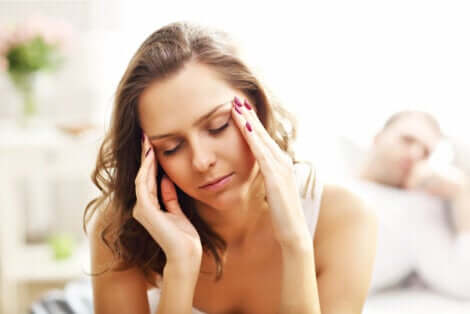What Causes Orgasm Headaches?

Orgasm headaches, or headaches associated with sexual activity, are common problems. It’s estimated that this issue affects 80% of men. In fact, it’s likely that almost everyone will experience this problem at some point in their life. Let’s look at what causes orgasm headaches.
Available data shows that 75% of cases are linked to headaches from the orgasms themselves. However, the remaining 25% are pre-orgasmic, meaning they happen earlier. The intensity and severity of the headache vary from person to person.
What causes orgasm headaches?
Normally, orgasm headaches are caused by an increase in sexual arousal. This makes the muscles in the neck and head contract. Another possible cause is increased blood pressure.
In addition, a study from the Wake Forest University School of Medicine states that those who suffer from migraines, tend to experience more intense sexual desire than those who suffer from other types of headaches. According to the study, both migraines and sexual desire are caused by low levels of serotonin.
Another study from the Clinical Hospital at the University of Valladolid shows that orgasm headaches could be related to the hypothalamus’ activity. Sex increases hypothalamic activity, which would trigger the headache. However, the researchers clarify that more research into this theory is still necessary.

Read more: Get Rid of Headaches with These 5 Natural Remedies
What do these headaches feel like?
Usually, orgasm headaches come on suddenly, before, during, or at the end of sexual activity. The pain is stabbing and many describe it as like lightning to the head. This is one of the most severe types of headaches.
In other cases, the discomfort starts as a dull ache in the back of the head and neck. Little by little, as the sexual arousal increases, the pain increases.
Its course is unpredictable. It can last from one minute to three hours, or even several days. Sometimes, the pain will reduce gradually until it fully disappears, while other times the pain will go away as quickly as it showed up.
This type of headache can occur once or several times over the course of a few months. It’s estimated that 50% of people affected by them will experience these episodes for 6 months. 40% will have them for up to a year. They’re also most common in men between the ages of 25 and 35.
When should you see a doctor?
Orgasm headaches are considered benign. Therefore, there’s usually nothing to worry about. However, there are cases in which there may be another, undetected condition. If the pain is too severe and sudden, we recommend talking to your doctor.
We also recommend seeing your doctor if other symptoms appear, such as:
- Vomiting
- Neck stiffness
- Loss of feeling
- Very severe pain lasting more than one day
- Loss of consciousness
- Seizures
Your doctor will give you a physical examination. They may require tests, such as an MRI, CT scan, angiogram, angiography, or lumbar puncture. This will help confirm or rule out serious problems such as aneurysms.

Read more: 4 Causes of Morning Headaches
An almost always benign issue
Your orgasm headache is most likely not associated with any other illness. Therefore, a commonly used analgesic should help you get over it. Sometimes, your doctor may find it necessary to prescribe more specific medications. We should also note that several medications used to treat migraines or other types of headaches can affect sexual function.
Many people will only experience this type of headache once in their lives. Other people may experience them for a few months. However, there are also cases in which the headache is continuous and is caused by the emotional pressure of responding sexually.
All cited sources were thoroughly reviewed by our team to ensure their quality, reliability, currency, and validity. The bibliography of this article was considered reliable and of academic or scientific accuracy.
- Wake Forest University Baptist Medical Center. (2006, June 9). Migraine Headaches And Sexual Desire May Be Linked. ScienceDaily. Retrieved December 18, 2020 from www.sciencedaily.com/releases/2006/06/060609121759.htm
- Santos Lasaosa, et. al., S. (2020). Manual de práctica clínica en cefaleas. Sociedad Española de Neurología. https://www.sen.es/pdf/2020/ManualCefaleas2020.pdf.
- Velasco, F. “Cefalea en racimos y otras cefaleas primarias recurrentes.” Gaceta Médica de Bilbao 99.1 (2002): 17-22.
- GONZÁLEZ, D. H. S. 4 CAFALEA ASOCIADA A LA ACTIVIDAD SEXUAL. NeuroeJe, 11(1).
- Ontañón Gómez, Jesús. “Cefalea relacionada con la actividad sexual en una Unidad de Cefaleas.” (2016).
This text is provided for informational purposes only and does not replace consultation with a professional. If in doubt, consult your specialist.








